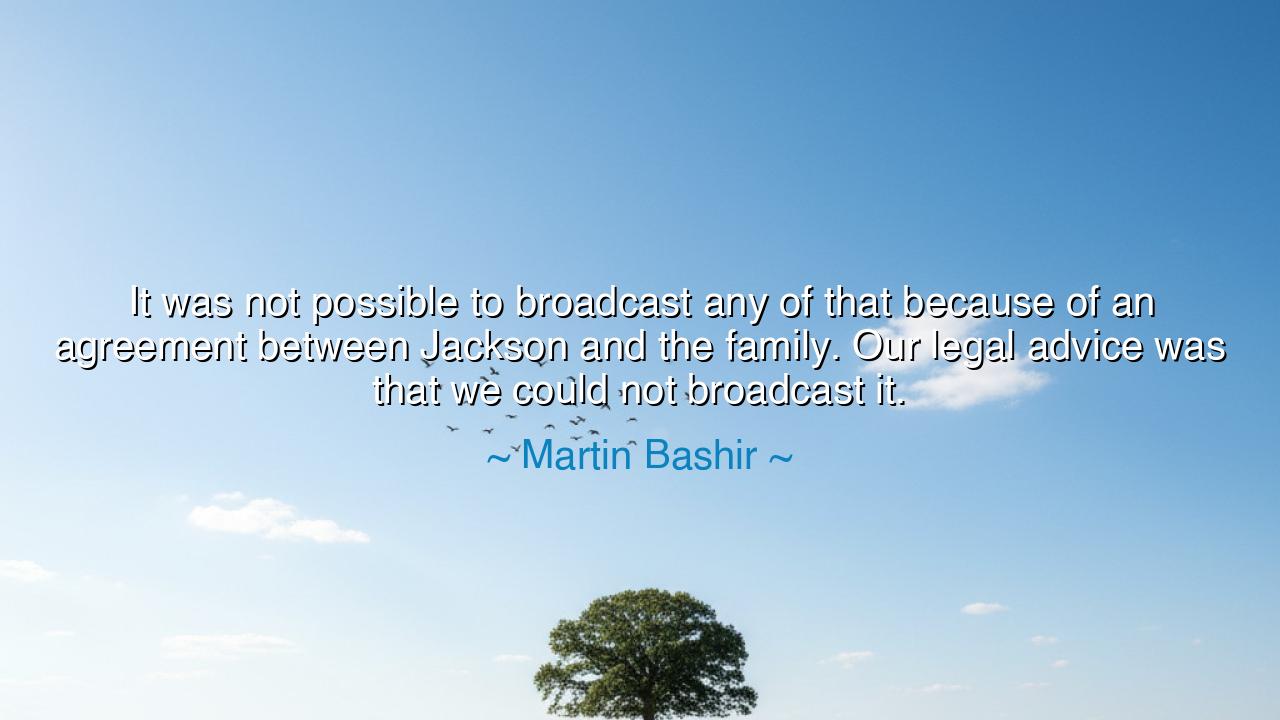
It was not possible to broadcast any of that because of an
It was not possible to broadcast any of that because of an agreement between Jackson and the family. Our legal advice was that we could not broadcast it.






There are moments in history when truth itself is bound by silence — not because men do not wish to speak it, but because the laws of man forbid it. In the words of Martin Bashir, “It was not possible to broadcast any of that because of an agreement between Jackson and the family. Our legal advice was that we could not broadcast it.” we hear not merely a statement about a television decision, but a revelation of the eternal struggle between truth and law, freedom and obligation, the journalist and the justice system. It is a reminder that even the seeker of truth must bow before the covenant of law, and that in the mortal world, knowledge is often constrained by agreements forged in the name of protection or power.
In the ancient days, storytellers were the keepers of memory. They sang of kings, of wars, of betrayals, and of divine justice. But even they knew the danger of speaking what must not yet be spoken. The tongue, once loosened, can change the course of nations. And so, just as oracles veiled their visions in riddles, so too does the modern journalist sometimes cloak truth in silence, not from fear, but from the binding force of legal agreements. In Bashir’s confession, one hears the lament of a man who has seen more than he is permitted to reveal, standing at the crossroads between duty to the public and obedience to the law.
Michael Jackson, the figure at the heart of Bashir’s statement, was more than a man; he was a myth in motion. To capture his life was to capture lightning in a bottle — brilliance and brokenness intertwined. Yet even in his most vulnerable hours, the law wrapped him in a cloak of secrecy. The agreement between Jackson and his family was not merely a legal document; it was a fortress, built to guard what could not bear the harsh light of the world. Bashir’s words remind us that behind every public story lies a realm of private truth, locked away by the chains of confidentiality.
History offers countless echoes of this same dilemma. Recall the story of Galileo, who gazed upon the heavens and saw that the Earth was not the center of creation. Yet he could not broadcast his discovery freely, for the laws of his time — ecclesiastical, not legal — forbade it. The truth existed, but the voice that bore it was silenced by authority. Just as Bashir bowed to legal counsel, Galileo bowed to the Inquisition, and though centuries apart, both understood the same eternal truth: that freedom of expression, no matter how righteous, must sometimes yield to the structures of power that rule the age.
But the ancients also taught that silence is not always weakness. Sometimes, to withhold truth is an act of wisdom, not cowardice. A warrior does not reveal his battle plan to the enemy; a healer does not disclose the secrets of his art to those who would misuse it. Likewise, in the realm of journalism and law, to honor one’s agreements can be a mark of integrity — a recognition that trust, once broken, can never be restored. In this sense, Bashir’s restraint, though painful, reflects not betrayal of truth but respect for the sacred balance between revelation and restraint.
Yet, there is sorrow in his tone — the sorrow of a man who knows that the truth could have changed hearts, and yet was barred from the world’s hearing. This sorrow has echoed through every age: the scholar whose research is censored, the witness whose testimony is sealed, the artist whose vision is buried by decree. For all these, the struggle remains the same — to reconcile the moral duty to speak with the legal duty to obey. The wisest among them learn patience, trusting that in time, truth finds its own way into the light, as rivers find their way to the sea.
Let this be the lesson to those who come after: the law is not the enemy of truth, but a guardian that must be navigated with care. To serve truth is noble, but to serve it wisely is divine. The path of righteousness is not in shouting all that we know, but in discerning when to speak, and when to wait.
And so, remember the voice of Bashir — restrained, yet resonant — as a testament to the tension of our age. In a world hungering for scandal and revelation, he reminds us that even truth must walk in step with justice. Speak honestly, but act lawfully. Seek truth, but honor your word. For only through this balance can the light of knowledge endure without destroying the harmony that binds the world.






AAdministratorAdministrator
Welcome, honored guests. Please leave a comment, we will respond soon